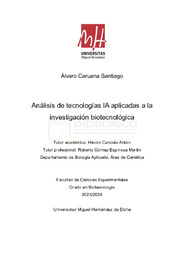Please use this identifier to cite or link to this item:
https://hdl.handle.net/11000/33133Full metadata record
| DC Field | Value | Language |
|---|---|---|
| dc.contributor.advisor | Candela Antón, Héctor | - |
| dc.contributor.advisor | Gómez-Espinosa Martín, Roberto | - |
| dc.contributor.author | Caruana Santiago, Álvaro | - |
| dc.contributor.other | Departamentos de la UMH::Biología Aplicada | es_ES |
| dc.date.accessioned | 2024-09-16T10:23:39Z | - |
| dc.date.available | 2024-09-16T10:23:39Z | - |
| dc.date.created | 2024-06 | - |
| dc.identifier.uri | https://hdl.handle.net/11000/33133 | - |
| dc.description.abstract | En las últimas décadas han aumentado las tasas de publicación científica a lo largo de todas las disciplinas, incluidas las biomédicas. Esto ha generado una creciente dificultad de mantenerse al tanto del estado del arte del campo de estudio de los investigadores. De manera similar, la presión por publicar puede volverse un problema para la comunidad científica, al forzar al personal investigador a generar artículos científicos cuya calidad puede estar comprometida. Para contrarrestar estos obstáculos se han de desarrollar prácticas que ayuden al investigador a realizar su labor. En este marco, la inteligencia artificial puede ser una respuesta eficaz. Con cantidad de herramientas donde elegir, la inteligencia artificial es una campo que ayuda a potenciar la tareas de investigación. Es importante hacer un repaso por los fundamentos de la IA, para saber cuáles son los mejores enfoques para resolver los problemas que surjan durante la proceso científico, a la vez que se ha de poner en valor los grande descubrimientos que se ha hecho con su ayuda. Por último, y para tener una visión global, es de interés debatir sobre los dilemas éticos que el uso de la inteligencia artificial puede conllevar. | es_ES |
| dc.description.abstract | In recent decades, scientific publication rates have increased across all disciplines, including biomedical disciplines. This has led to increasing difficulty in keeping researchers abreast of the state of the art in their field of study. Similarly, the pressure to publish can become a problem for the scientific community, forcing research personnel to generate scientific articles whose quality may be compromised. To counteract these obstacles, practices have been developed that will help the researcher conduct their work. In this framework, artificial intelligence can be an effective response. With several tools to choose from, artificial intelligence is a field that helps enhance research tasks. It is important to review the foundations of AI, to know which the best approaches are to solve the problems that arise during the scientific process, while at the same time valuing the great discoveries that have been made with its help. Finally, and to have a global vision, it is of interest to debate the ethical dilemmas that artificial intelligence can entail. | es_ES |
| dc.format | application/pdf | es_ES |
| dc.format.extent | 31 | es_ES |
| dc.language.iso | spa | es_ES |
| dc.publisher | Universidad Miguel Hernández de Elche | es_ES |
| dc.rights | info:eu-repo/semantics/openAccess | es_ES |
| dc.rights.uri | http://creativecommons.org/licenses/by-nc-nd/4.0/ | * |
| dc.subject | inteligencia artificial | es_ES |
| dc.subject | investigación científica | es_ES |
| dc.subject | modelos lenguaje gran escala | es_ES |
| dc.subject | ética IA | es_ES |
| dc.subject | redes neuronales | es_ES |
| dc.subject | artificial intelligence | es_ES |
| dc.subject | scientific research | es_ES |
| dc.subject | large language models | es_ES |
| dc.subject | AI ethics | es_ES |
| dc.subject | neural networks | es_ES |
| dc.subject.classification | Genética | es_ES |
| dc.subject.other | CDU::5 - Ciencias puras y naturales::57 - Biología | es_ES |
| dc.title | Análisis de tecnologías IA aplicadas a la investigación biotecnológica | es_ES |
| dc.type | info:eu-repo/semantics/bachelorThesis | es_ES |

View/Open:
TFG_ÁlvaroCaruanaSantiago.pdf
1,43 MB
Adobe PDF
Share:
.png)
